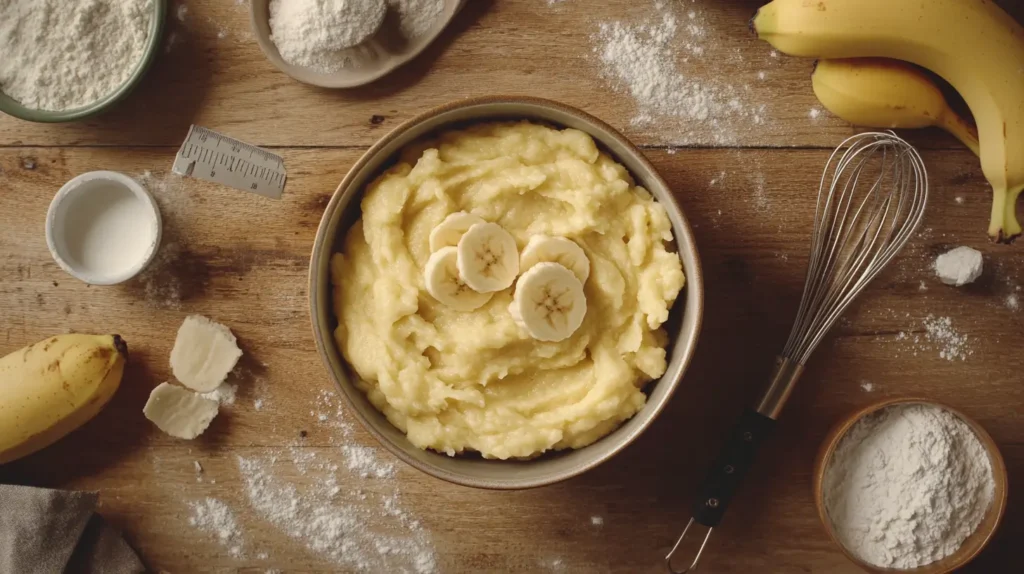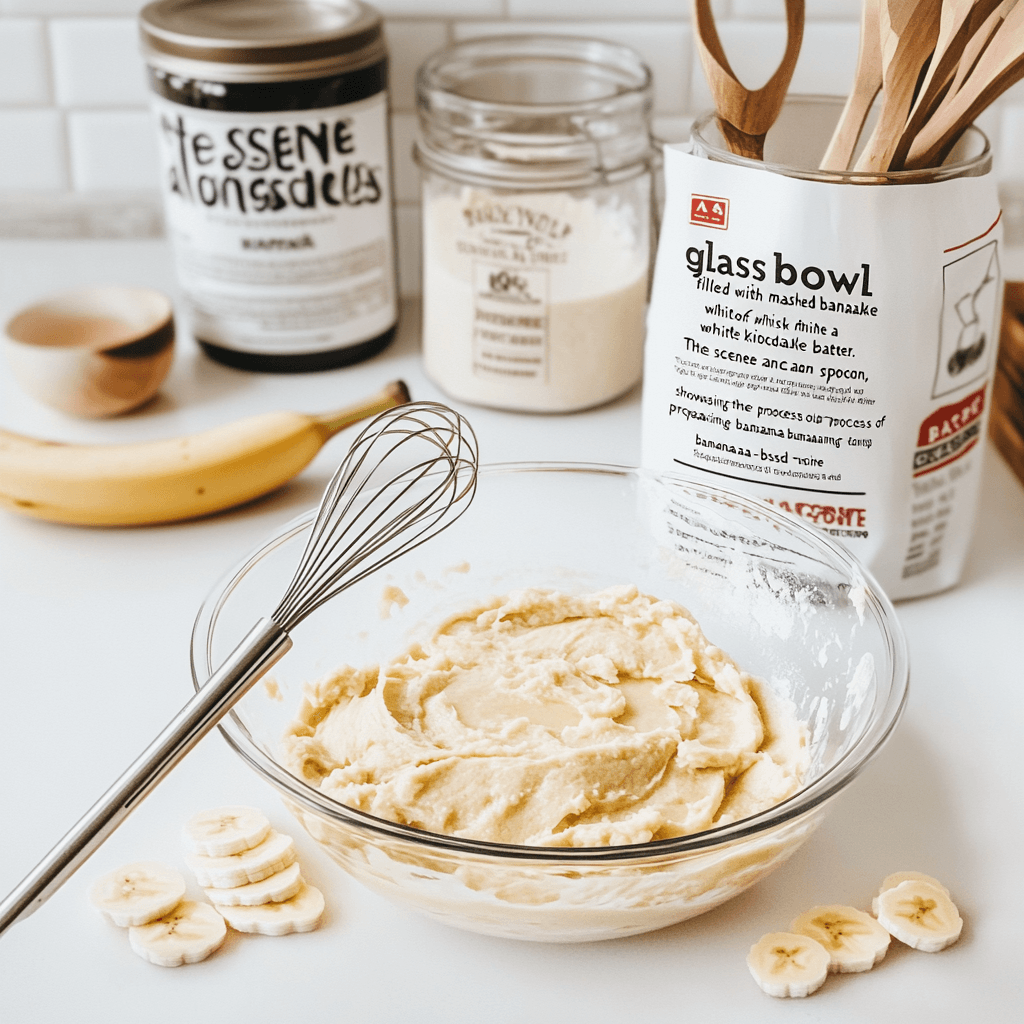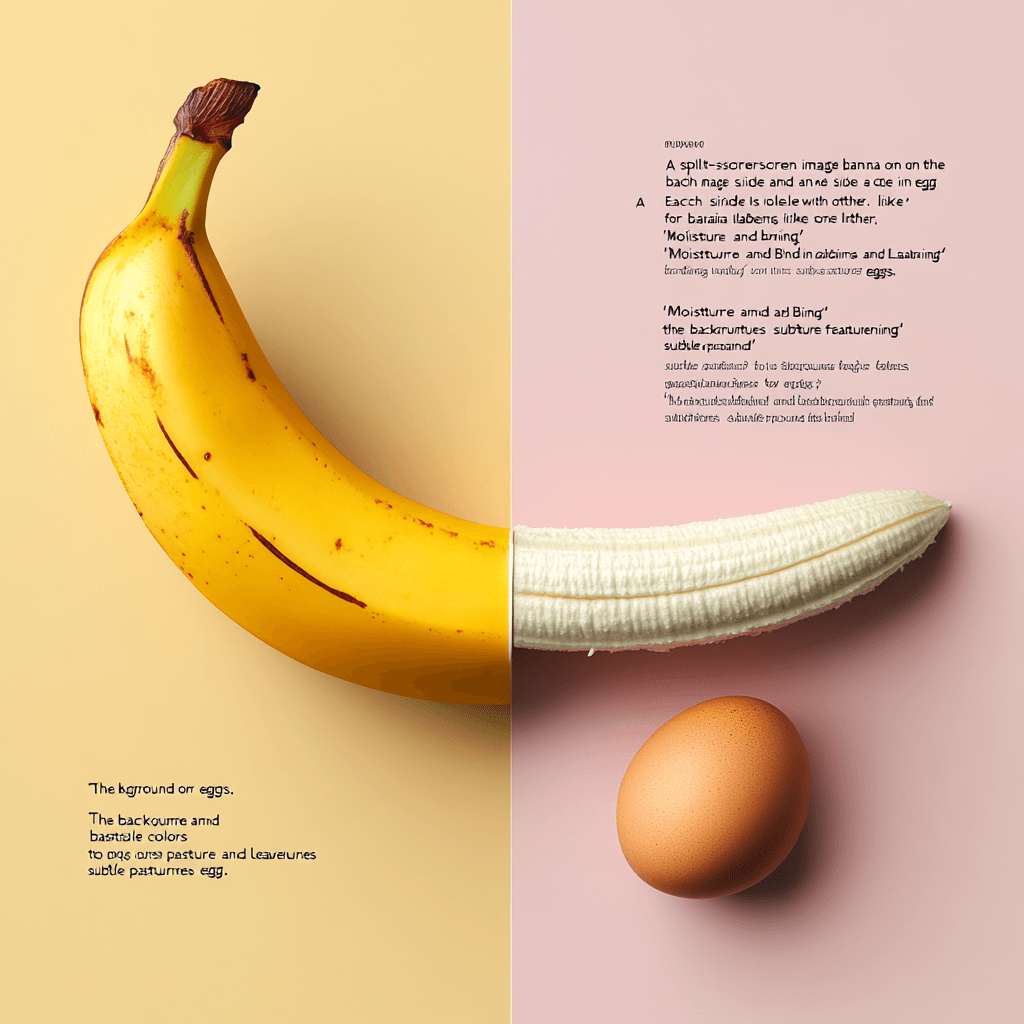
When replacing eggs with bananas in cooking or baking, the standard substitution ratio is:
- 1 medium-sized ripe banana (approximately 1/4 to 1/3 cup mashed banana) can replace 1 egg.
This ratio works well in recipes where eggs primarily act as a binder or add moisture, such as in cakes, muffins, or pancakes.
Table of Contents
What is the Purpose of Replacing Eggs with Bananas?
There are various reasons why people substitute bananas for eggs:
1. Dietary Preferences
- Vegan Diets: Bananas are a plant-based alternative that aligns with vegan principles.
- Plant-Based Living: For those who prefer minimizing animal product consumption, bananas are an easy and natural substitute.
2. Health Reasons
- Allergies: People with egg allergies can use bananas as a safe replacement.
- Cholesterol Concerns: Unlike eggs, bananas are cholesterol-free and lower in fat.
3. Practicality
- Availability: If you’re out of eggs, bananas are a common kitchen ingredient that can be used as a quick alternative.
- Cost-Effectiveness: Bananas are often more affordable than eggs.
4. Flavor Profile
- Natural Sweetness: Bananas add a mild sweetness and distinct flavor to baked goods, which may enhance certain recipes.
Considerations When Using Bananas as an Egg Substitute
While bananas are an effective replacement for eggs in many recipes, they might not work in all situations. Understanding how much banana to replace 1 egg can ensure better results in baking or cooking. Here are a few considerations when deciding how much banana to replace 1 egg:
- Flavor: Bananas add a fruity taste that may not suit every recipe. If you’re asking how much banana to replace 1 egg, remember that flavor can be a factor in savory dishes.
- Texture: Recipes relying on eggs for leavening, like soufflés, may not rise as effectively with bananas. Knowing how much banana to replace 1 egg is crucial for maintaining the right texture.
- Moisture Content: Bananas add extra moisture, which can alter the texture of baked goods. Adjust liquids in the recipe to account for how much banana to replace 1 egg.
Understanding Egg Substitutes
Eggs play a crucial role in many recipes, serving as a binder, leavening agent, or moisture provider. However, some individuals seek alternatives for dietary, health, or practical reasons. Bananas are one of the most popular substitutes due to their versatility and availability.
Why Use Banana as an Egg Substitute?
Using bananas as an egg substitute is favored for several reasons:
1. Plant-Based Alternative
- Vegan-Friendly: Bananas are a natural, plant-based substitute, ideal for vegan diets.
- Eco-Friendly: Opting for bananas over eggs can align with sustainability goals, as they typically have a lower environmental impact.
2. Allergy-Friendly
- Egg Allergies: For individuals who are allergic to eggs, bananas provide a safe alternative without compromising the texture or taste of baked goods.
3. Health Benefits
- Nutrient-Rich: Bananas are high in potassium, vitamin B6, and dietary fiber, making them a nutritious addition to recipes.
- Low in Fat and Cholesterol: Unlike eggs, bananas are fat-free and contain no cholesterol, making them suitable for heart-healthy diets.
4. Convenience
- Readily Available: Bananas are a common household ingredient and can be easily mashed and incorporated into recipes.
- Cost-Effective: They are often more economical compared to eggs, especially during periods of price fluctuation in egg markets.
5. Unique Flavor and Texture
- Natural Sweetness: Bananas contribute a subtle sweetness, enhancing the flavor of desserts and baked goods.
- Moisture Addition: They help maintain the moisture and softness of cakes, muffins, and pancakes, ensuring a tender crumb.
The Science Behind Banana as an Egg Substitute

Bananas are a popular egg substitute in cooking and baking due to their natural properties that mimic some of the functions of eggs. Understanding the science behind this substitution can help ensure successful results in your recipes.
How Bananas Bind and Add Moisture to Recipes
1. Binding Properties
- Rich in Pectin: Bananas contain pectin, a natural fiber that acts as a binding agent, helping to hold ingredients together in recipes like cakes, muffins, and cookies.
- Starch Content: The starches in bananas create structure in baked goods, preventing them from falling apart.
- Natural Sugars: The sugars in bananas caramelize during baking, contributing to the cohesion of the finished product.
2. Moisture Contribution
- High Water Content: Bananas are composed of approximately 75% water, which helps keep baked goods moist and soft.
- Oil Replacement: The moisture from mashed bananas can sometimes reduce the need for added fats, such as butter or oil, making recipes healthier.
3. Leavening Assistance
- While bananas are not a direct leavening agent like eggs, they pair well with baking soda or baking powder. The acidity in ripe bananas reacts with these ingredients to create a slight rise in baked goods.
4. Flavor Enhancement
- The sweet and fruity flavor of bananas naturally complements many recipes, especially desserts, enhancing the overall taste profile.
Limitations to Consider
- Limited Leavening Power: For recipes that rely heavily on eggs for rise, such as soufflés or meringues, bananas may not provide the same effect.
- Distinct Flavor: Bananas impart their unique taste, which may not suit all savory or neutral recipes.
Nutritional Benefits of Bananas in Baking
When used as an egg substitute, bananas not only enhance the texture and flavor of baked goods but also offer several nutritional benefits. They are a wholesome addition to recipes, contributing essential nutrients that can make your creations healthier.
Calories, Carbs, and Nutrients in Bananas
- Calories
- A medium-sized banana (about 118 grams) contains approximately 105 calories.
- Compared to a large egg (about 70 calories), bananas add slightly more energy to your recipe but also provide additional nutrients.
- Carbohydrates
- Bananas are a rich source of carbohydrates, offering around 27 grams per medium banana.
- These carbs come from natural sugars (glucose, fructose, and sucrose) and dietary fiber, providing a quick energy boost and promoting satiety.
- Fiber
- A medium banana provides about 3 grams of fiber, which aids digestion and supports gut health.
- This makes bananas a healthier choice compared to eggs, which lack dietary fiber.
- Vitamins
- Vitamin B6: Bananas are an excellent source of vitamin B6, which supports brain health and red blood cell production.
- Vitamin C: A small amount of vitamin C in bananas contributes to immune health and collagen production.
- Minerals
- Potassium: Bananas are well-known for their high potassium content, with around 422 mg per medium fruit. Potassium is essential for heart health and muscle function.
- Magnesium: Provides around 32 mg, supporting bone health and energy production.
- Natural Sugars
- Bananas contain naturally occurring sugars, which contribute sweetness to baked goods and reduce the need for additional sugar.
- Fat and Cholesterol
- Bananas are fat-free and contain no cholesterol, making them a heart-healthy alternative to eggs.
Additional Benefits in Baking
- Lower Fat Content: Using bananas instead of eggs can reduce the overall fat content of recipes.
- Nutritional Boost: Bananas add vitamins and minerals that are otherwise absent in traditional egg-based recipes.
- Kid-Friendly Option: The added natural sweetness and nutrients make banana-enhanced recipes a hit with children.
Health Considerations When Replacing Eggs
Replacing eggs with bananas in recipes offers several health benefits, particularly for those with specific dietary needs or restrictions. This substitution can cater to vegan lifestyles and allergy concerns while contributing to a healthier diet overall.
Vegan and Allergy-Friendly Benefits
- Vegan Benefits
- Plant-Based Alternative: Bananas are a natural and cruelty-free option, perfectly aligning with vegan dietary principles.
- Eco-Friendly Choice: By opting for bananas instead of eggs, you may also reduce the environmental impact associated with animal farming.
- Nutrient-Rich: Bananas contribute valuable vitamins, minerals, and dietary fiber that enhance the nutritional value of vegan baked goods.
- Allergy-Friendly
- Safe for Egg Allergies: For individuals with egg allergies, bananas are a safe and effective replacement that allows them to enjoy baked goods without risk.
- Reduced Allergenic Load: Bananas are generally hypoallergenic, making them suitable for people with multiple food sensitivities.
- Heart-Healthy
- No Cholesterol: Unlike eggs, bananas contain no cholesterol, making them a heart-friendly alternative.
- Low in Saturated Fat: Bananas help reduce the saturated fat content in recipes, supporting overall cardiovascular health.
- Digestive Benefits
- Rich in Fiber: The dietary fiber in bananas aids digestion and helps maintain a healthy gut.
- Easy on the Stomach: Bananas are gentle on the stomach and can be more easily digested than eggs, particularly for those with sensitive digestive systems.
Practical and Nutritional Advantages
- Easily Accessible: Bananas are widely available and affordable, making them a practical choice for various dietary needs.
- Nutrient Boost: They provide essential nutrients, such as potassium and vitamin B6, that enhance the overall health benefits of recipes.
How Much Banana to Replace 1 Egg?
When substituting bananas for eggs in baking or cooking, it’s important to use the right amount to achieve the desired texture and binding properties in your recipe. Bananas are a versatile and effective alternative to eggs, especially in sweet and moist recipes.
The Right Quantity of Banana for One Egg Substitute
The standard substitution ratio for replacing one egg with banana is:
- 1 medium-sized ripe banana (mashed) = 1 egg
This typically translates to approximately 1/4 to 1/3 cup of mashed banana, depending on the size of the banana.
Tips for Success:
- Use Ripe Bananas: Fully ripe bananas with brown spots are best, as they are softer and easier to mash. Their sweetness also enhances the flavor of baked goods.
- Measure Precisely: For consistency, use a measuring cup to ensure you use the correct quantity of mashed banana.
- Pair with Leavening Agents: Since bananas lack the leavening properties of eggs, ensure your recipe includes baking soda or baking powder if a rise is needed.
When to Use Bananas as an Egg Substitute
Bananas work well in recipes where eggs primarily serve as a binder or moisture provider, such as:
- Pancakes
- Muffins
- Cakes
- Brownies
- Quick breads
However, they may not be suitable for recipes requiring eggs for their leavening or emulsifying properties, like soufflés or mayonnaise.
Conversion Ratios for Banana and Egg
When substituting bananas for eggs in baking, accurate measurements are key to achieving the desired texture and structure in your recipes. Here’s a guide to common conversion ratios and how to use them effectively.
Common Measurements for Baking
- 1 Egg = 1/4 to 1/3 Cup Mashed Banana
- This is equivalent to approximately 65–85 grams of mashed banana.
- Use a medium-sized banana (about 7–8 inches long) to replace one egg.
- Multiple Egg Replacements
- For recipes requiring more than one egg, multiply the ratio:
- 2 Eggs = 1/2 to 2/3 Cup Mashed Banana
- 3 Eggs = 3/4 to 1 Cup Mashed Banana
- Be cautious when substituting multiple eggs, as too much banana may overly alter the texture or flavor.
- For recipes requiring more than one egg, multiply the ratio:
- Weight-Based Conversion
- If your recipe specifies egg weight, note that one large egg weighs approximately 50–60 grams (without the shell). Use an equal weight of mashed banana for substitution.
- Banana Purée Consistency
- Ensure the mashed banana is smooth and free of lumps to mix evenly with other ingredients.
Tips for Baking with Bananas
- Moisture Balance: Bananas add moisture, so adjust the liquid content in the recipe if needed.
- Flavor Compatibility: The natural sweetness and fruity flavor of bananas pair well with desserts but may not suit savory dishes.
- Leavening Agents: If eggs provide rise in your recipe, add 1/2 teaspoon of baking powder or baking soda per replaced egg for better results.
Practical Example
If your pancake recipe calls for 2 eggs:
- Replace them with 1/2 cup of mashed banana.
- Add a pinch of baking powder to ensure fluffiness.
Bananas vs. Chia Seeds or Flaxseeds
Bananas, chia seeds, and flaxseeds are popular egg substitutes in baking, each offering unique properties. The choice between them depends on the recipe and dietary needs. Here’s a comparison to help decide when to use chia or flaxseeds instead of bananas.
When to Use Chia or Flaxseeds Instead of Bananas
- Flavor Considerations
- Bananas: Impart a sweet, fruity flavor, which is ideal for desserts like cakes, muffins, and pancakes but may not work in savory dishes.
- Chia or Flaxseeds: Have a neutral flavor, making them better suited for savory recipes like breads, crackers, or veggie burgers.
- Texture
- Bananas: Add moisture and create a soft, tender texture in baked goods.
- Chia or Flaxseeds: Provide structure and a slightly denser texture, mimicking the binding properties of eggs.
- Nutritional Profile
- Bananas: High in potassium, vitamin B6, and natural sugars, but low in protein and omega-3s.
- Chia and Flaxseeds: Rich in omega-3 fatty acids, dietary fiber, and protein, making them a more nutrient-dense option for those seeking heart-healthy or protein-boosted recipes.
- Dietary Needs
- Bananas: Suitable for those avoiding eggs and prefer natural sweetness but not ideal for low-carb diets due to higher sugar content.
- Chia or Flaxseeds: Perfect for keto or low-carb diets as they are low in carbohydrates and high in healthy fats.
- Preparation
- Bananas: Ready to use when mashed.
- Chia or Flaxseeds: Require mixing with water to create a gel-like consistency. For one egg replacement:
- Mix 1 tablespoon of chia seeds or ground flaxseeds with 2.5 tablespoons of water.
- Let sit for 5–10 minutes until it forms a gel.
Best Uses
- Bananas: Use in recipes where sweetness and moisture are desired, such as:
- Muffins, cakes, pancakes, quick breads, and brownies.
- Chia or Flaxseeds: Use in recipes requiring a neutral flavor and structure, such as:
- Whole-grain breads, cookies, savory patties, and crackers.
FAQs About Using Bananas to Replace Eggs

Using bananas as an egg substitute often raises questions about their effectiveness and versatility in different recipes. Here are answers to some of the most common questions:
1. Can I Replace Eggs with Bananas in Any Recipe?
- Bananas work best in recipes where eggs provide moisture and binding, such as cakes, muffins, quick breads, and pancakes.
- They may not be suitable for recipes relying on eggs for leavening (e.g., soufflés) or emulsifying (e.g., mayonnaise).
2. How Does Replacing Eggs with Bananas Affect the Flavor?
- Bananas add a mild fruity sweetness that complements desserts and baked goods. If you prefer a neutral flavor, bananas may not be ideal for savory dishes.
3. What Texture Changes Can I Expect?
- Recipes made with bananas are typically softer and more moist than those made with eggs. This can be a benefit in cakes and muffins but might be less desirable in crisp cookies.
4. Are Bananas Suitable for Gluten-Free Baking?
- Yes, bananas are naturally gluten-free and work well as an egg substitute in gluten-free recipes, adding moisture and binding without gluten.
5. How Can I Replace Multiple Eggs with Bananas?
- Use the standard conversion: 1/4 to 1/3 cup of mashed banana per egg. However, using bananas for more than two eggs may affect texture and flavor significantly.
6. Can I Combine Bananas with Other Egg Substitutes?
- Yes! You can pair bananas with chia or flaxseed eggs, baking powder, or applesauce to balance moisture, structure, and leavening in recipes.
7. Can I leave banana bread out overnight to cool?
- Leaving banana bread out overnight to cool can be safe and effective if proper precautions are taken. Here’s what you need to know to ensure your bread stays fresh and safe to eat
Conclusion
Final Thoughts on Using Banana as an Egg Replacement
Using bananas as an egg substitute is a simple, nutritious, and versatile option, especially in sweet baked goods. They add natural sweetness, moisture, and essential nutrients while catering to various dietary needs, such as vegan or allergy-friendly baking.
However, it’s important to consider the flavor and texture they bring to recipes. Bananas are not a universal replacement for eggs but excel in recipes that benefit from their unique qualities. With proper measurements and adjustments, you can enjoy delicious, plant-based versions of your favorite baked treats.
